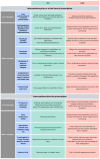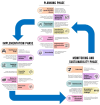State of the Art of Antimicrobial and Diagnostic Stewardship in Pediatric Setting
- PMID: 40001376
- PMCID: PMC11852234
- DOI: 10.3390/antibiotics14020132
State of the Art of Antimicrobial and Diagnostic Stewardship in Pediatric Setting
Abstract
Antimicrobial stewardship programs (ASPs) and diagnostic stewardship programs (DSPs) are essential strategies for effectively managing infectious diseases and tackling antimicrobial resistance (AMR). These programs can have a complementary impact, i.e., ASPs optimize antimicrobial use to prevent resistance, while DSPs enhance diagnostic accuracy to guide appropriate treatments. This review explores the current landscape of ASPs and DSPs in pediatric care, focusing on key factors, influencing their development, implementation, and evaluation across various settings. A multidisciplinary approach is necessary, involving multiple healthcare professionals to support comprehensive stewardship practices in pediatric care. No single intervention suits all settings, or even the same setting, in different countries; interventions must be tailored to each specific context, considering factors such as hospital capacity, patient complexity, and the parent-child dynamic. It is essential to educate caregivers on optimal antibiotic use through clear, concise messages adapted to their socioeconomic status and level of understanding. The cost-effectiveness of ASPs and DSPs should also be assessed, and standardized metrics should be employed to evaluate success in pediatric settings, focusing on outcomes beyond just antibiotic consumption, such as AMR rates. This manuscript further discusses emerging opportunities and challenges in ASP implementation, offering insights into future research priorities. These include large-scale studies to evaluate the long-term impact of ASPs, cost-effectiveness assessments of pediatric-specific diagnostic tools, and the integration of artificial intelligence to support clinical decision making. Addressing these areas will enhance the effectiveness and sustainability of ASPs, contributing to global efforts to combat AMR and improve pediatric health outcomes.
Keywords: antibiotics; antimicrobial resistance; antimicrobial stewardship programs; pediatric infectious diseases; point-of-care tests; rapid diagnostic tests.
Conflict of interest statement
The authors declare that they have no competing interests.
Figures
References
-
- Tersigni C., Montagnani C., D’argenio P., Duse M., Esposito S., Hsia Y., Sharland M., Galli L. Antibiotic prescriptions in Italian hospitalised children after serial point prevalence surveys (or pointless prevalence surveys): Has anything actually changed over the years? Ital. J. Pediatr. 2019;45:127. doi: 10.1186/s13052-019-0722-y. - DOI - PMC - PubMed
-
- De Luca M., Donà D., Montagnani C., Vecchio A.L., Romanengo M., Tagliabue C., Centenari C., D’argenio P., Lundin R., Giaquinto C., et al. Antibiotic prescriptions and prophylaxis in Italian children. Is it time to change? Data from the ARPEC Project. PLoS ONE. 2016;11:e0154662. doi: 10.1371/journal.pone.0154662. - DOI - PMC - PubMed
-
- Versporten A., Bielicki J., Drapier N., Sharland M., Goossens H., ARPEC Project Group. Calle G.M., Garrahan J.P., Clark J., Cooper C., et al. The Worldwide Antibiotic Resistance and Prescribing in European Children (ARPEC) point prevalence survey: Developing hospital-quality indicators of antibiotic prescribing for children. J. Antimicrob. Chemother. 2016;71:1106–1117. doi: 10.1093/jac/dkv418. - DOI - PubMed
Publication types
LinkOut - more resources
Full Text Sources




